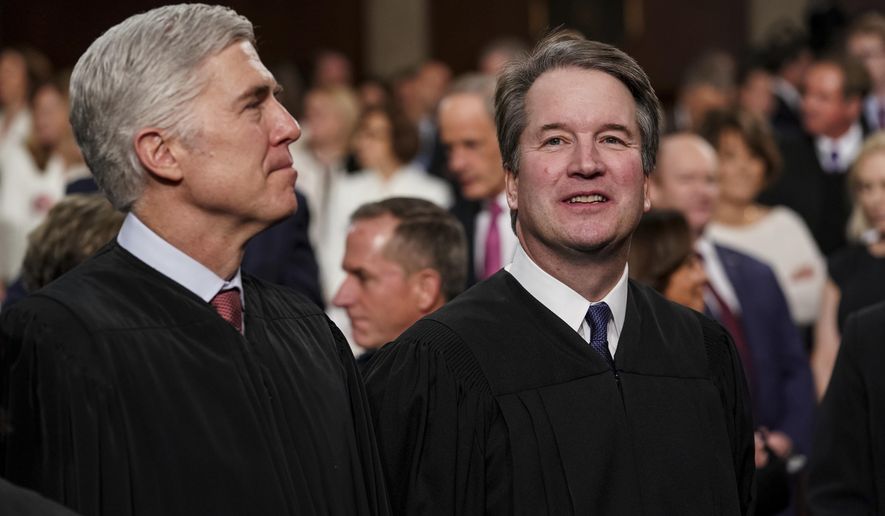Republican attorneys general are mounting a judicial attack on President Biden’s record number of executive orders and eyeing a favorable legal battlefield, thanks to scores of conservative judges whom President Trump appointed to the federal bench.
Lawsuits against Mr. Biden’s moves on climate change and immigration are working their way through district courts, where Mr. Trump installed 174 judges.
Further up the judicial ladder, Mr. Trump appointed 54 circuit judges and three Supreme Court justices.
Red state attorneys general told The Washington Times that they also are looking to the courts to check the Biden administration’s sweeping federal regulations on elections and transgender inclusion in the military and school athletics, as well as national COVID-19 pandemic mandates.
“We are going to be prepared, with various states being able to initiate challenges,” said Alabama Attorney General Steve Marshall, policy chairman for the Republican Attorneys General Association. “It is going to be a growing trend, and one that is going to be necessary.”
Mr. Biden issued more than 30 executive orders during his first few weeks in office, more than any other president in recent history. Conservatives see the unilateral moves as power grabs that run afoul of the separation of powers established by the Constitution.
Mr. Marshall called Mr. Biden’s series of orders a “fertile field for litigation.”
Twelve states have sued the administration over Mr. Biden’s climate change executive order in January that set up the Interagency Working Group on the Social Cost of Greenhouse Gases, whose mission is to attach a value to emissions reductions.
The group gave an initial estimate of $9.5 trillion for the cost of U.S. carbon dioxide, methane and nitrous oxide emissions, using figures from 2019 and 2020, according to the lawsuit.
The states argued in a federal court filing last week that the order violates the separation of powers. They said Mr. Biden has no authority to take such action under the Constitution or legislation passed by Congress.
“From higher energy bills to lost jobs, this massive expansion of federal regulatory power has the potential to impact nearly every household in this state. That’s why today I’m leading a coalition of states to put a stop to this executive order and protect Missouri families,” said Eric Schmitt, Missouri’s attorney general.
Judge Audrey G. Fleissig, an appointee of President Obama who rules for the Eastern District of Missouri, was assigned to the case.
Still, the odds of getting a conservative judge to hear the Republicans’ cases have greatly improved.
Mr. Trump came into office with 112 federal judicial vacancies to fill. With the help of then-Senate Majority Leader Mitch McConnell, Kentucky Republican, he filled most of the seats and gave the judiciary a conservative bent.
Mr. Obama had 53 vacancies when he entered office, and President George W. Bush had 80. Mr. Biden had 57 openings as of last month.
Texas and Arizona filed lawsuits against Mr. Biden’s order to pause deportations. Judge Drew Barnett Tipton, a Trump appointee who rules for the Southern District of Texas, halted the order last month.
Arizona’s lawsuit also challenges a rule to limit the number of arrests and deportations of illegal immigrants.
“Blindly releasing thousands of people, including convicted criminals and those who may be spreading COVID-19 into our state, is both unconscionable and a violation of federal law,” said Arizona Attorney General Mark Brnovich.
Stay tuned for more battles, he said.
“What you’re seeing is the left, the far left, is really trying to implement as many things as they can via the executive order process and then making the folks on the other side fight it out,” Mr. Brnovich said.
Republicans also plan lawsuits to try to keep some of Mr. Trump’s policies that the current administration wants to reverse, the attorneys general said.
One of those is a motion filed at the Supreme Court by Ohio Attorney General Dave Yost, joined by his counterparts in 18 other states, to force a ruling on using federal money for abortions. The Biden administration is trying to dismiss the case.
Arkansas Gov. Asa Hutchinson, a Republican, said he hopes the new makeup of the Supreme Court, with a 6-3 conservative majority, gives the Republican-led lawsuits a chance.
“Executive orders are issued, but this president has utilized them probably to a greater extent,” he said. “They should be a constitutional issue. They should be examined. Hopefully, they will get a good reception in the federal courts,” he recently told Fox News.
Elliot Mincberg, a senior fellow at the liberal People for the American Way, agreed that the number of Trump appointees at the district court level could be problematic for the Biden administration.
“The increased number of very conservative Trump judges will make it easier for challengers,” he said. “It is quite possible it can be overcome, but it will undoubtedly make the new Merrick Garland-led Justice Department work hard to get that done.”
It’s not just red states looking at the courts as a check on Mr. Biden’s flood of regulations. Advocacy groups are jumping on board, too.
The Western Energy Alliance challenged Mr. Biden’s order halting oil and gas leases on federal land.
“We like our chances in court,” Kathleen Sgamma, president of the group, told The Wall Street Journal this month. “The 230-plus judges that Trump has put in place are very significant.”
• Stephen Dinan and Valerie Richardson contributed to this report.
• Alex Swoyer can be reached at aswoyer@washingtontimes.com.




Please read our comment policy before commenting.